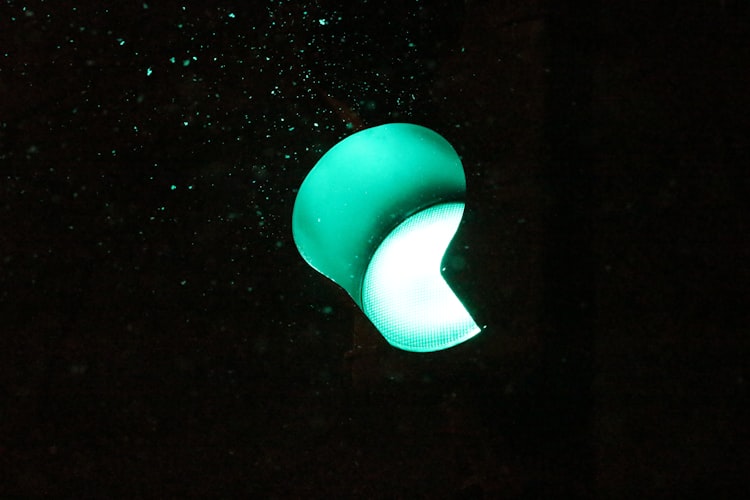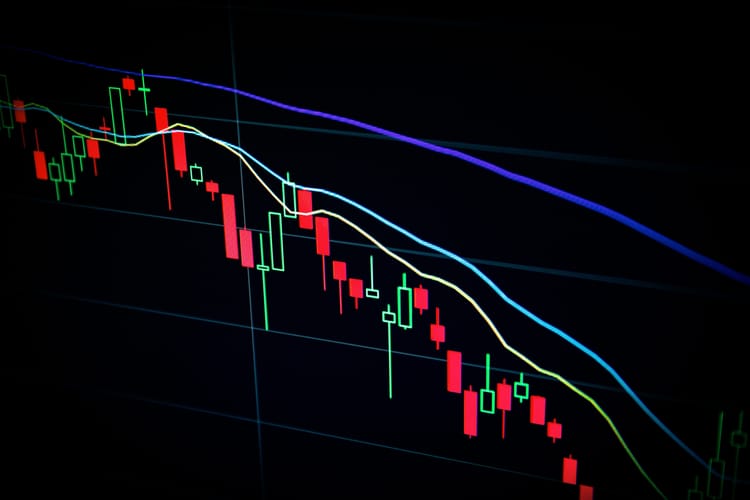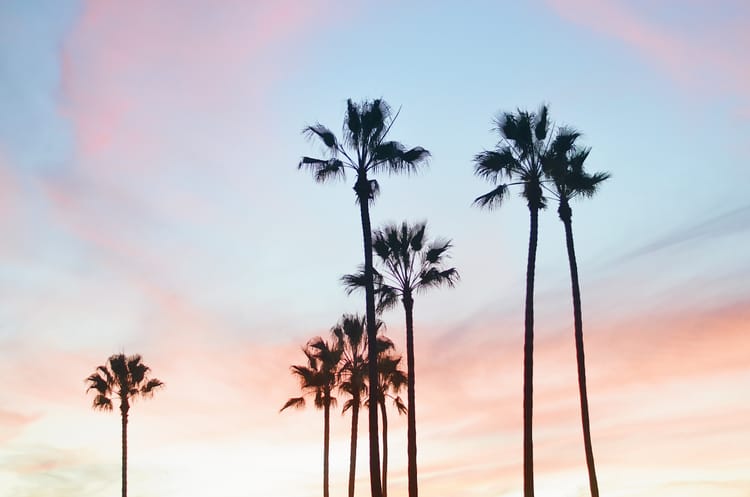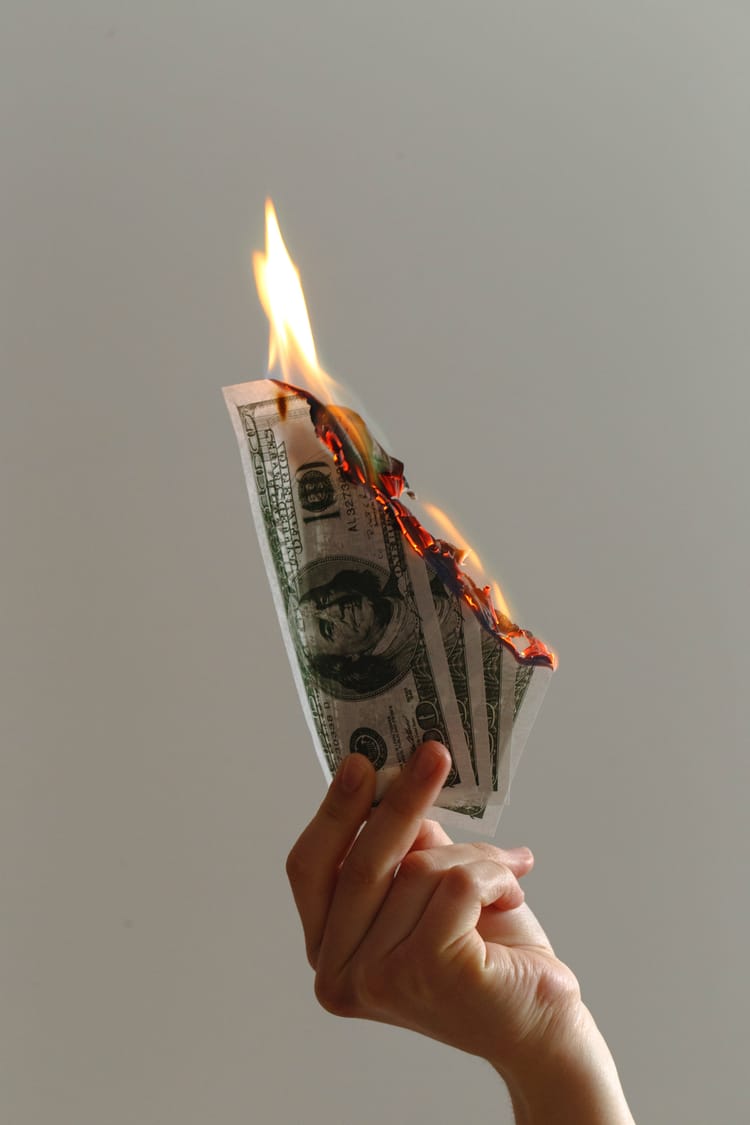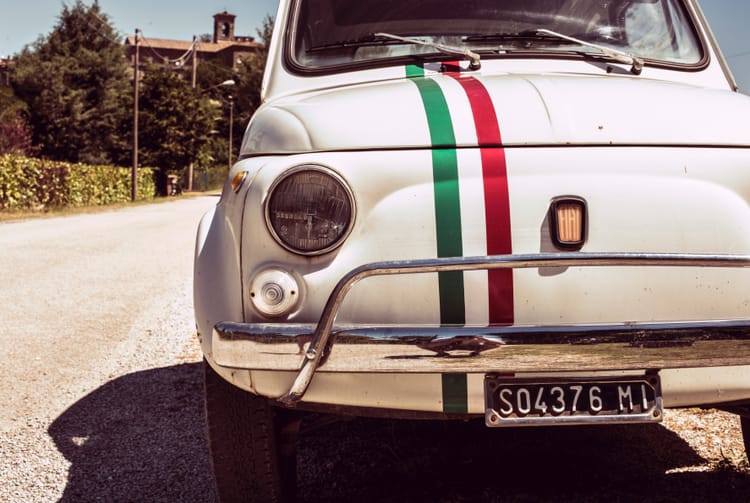Book Review: Barbarian Days
I am an obsessive person. Throughout life, I’ve had various passions – chess, boxing, travel, options trading – some more serious than others.
I’ve long wondered: “What if I were to pursue one of these passions to the absolute limits of my abilities…even if it meant the utter and deliberate neglect of every other area of my life?"
William Finnegan’s Barbarian Days: A Surfing Life is a 447-page meditation on this sort of devotion: a life designed around chasing the evanescent moment just before the crash of a wave.
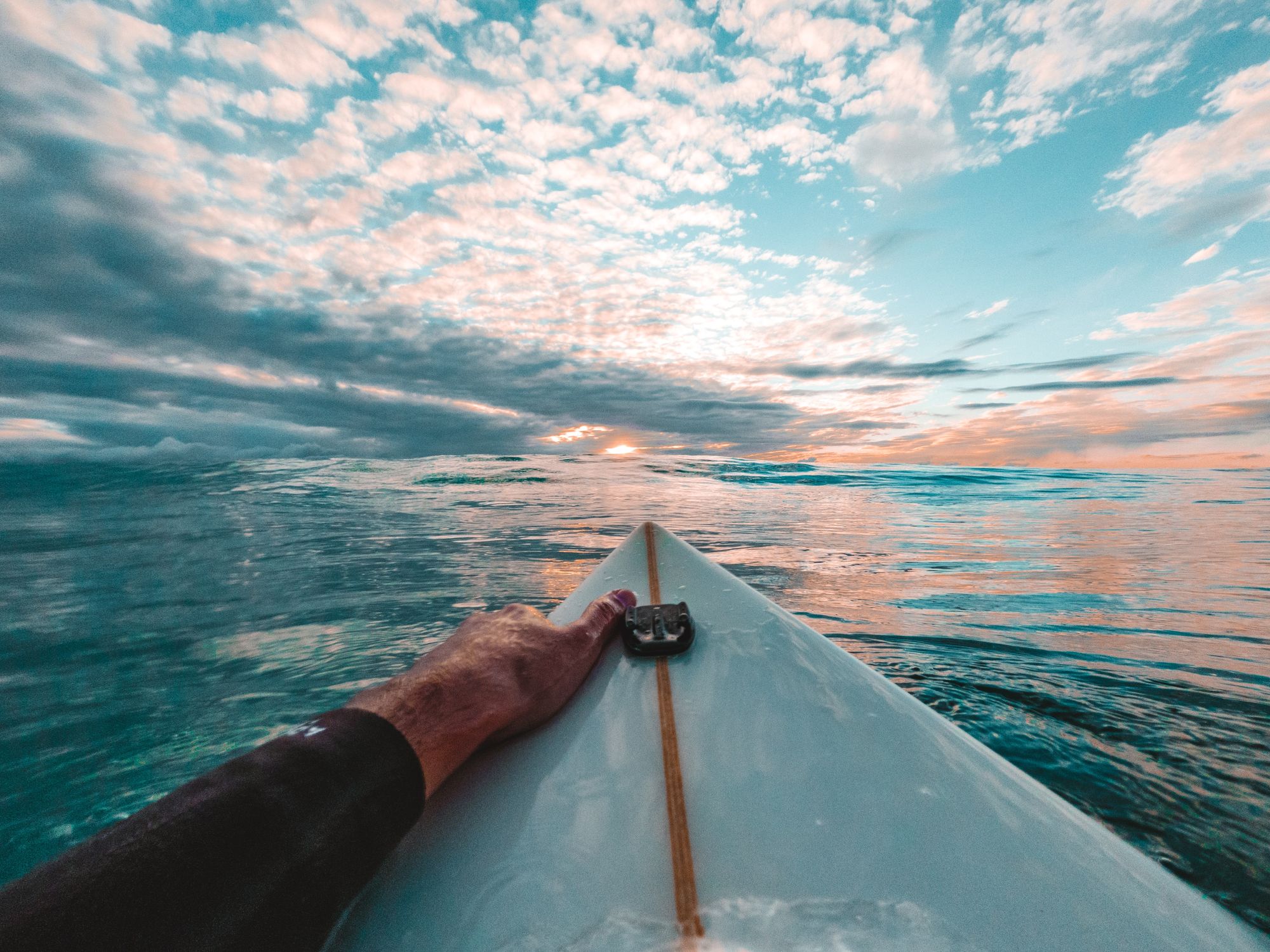
Monomania
William Finnegan grew up in the post-World War II boom of Southern California. He lived a typical suburban Los Angeles life, with the exception of a couple of short stints in Hawaii, where his dad worked on site as a film producer.
The stories from Hawaii were by far the most interesting part of his adolescence. His childhood, like the childhoods of many Baby Boomers, seemed to be defined by violence. Upon arriving at the rough-and-tumble Kaimuki Intermediate School, Finnegan is regularly whacked over the head with a two-by-four during shop class. He becomes acquainted with festive Hawaiian celebrations such as “Kill a Haole Day”, in which any white person was fair game to be beaten up.
My orientation program at school included a series of fistfights, some of them formally scheduled. There was a cemetery next to the campus, with a well-hidden patch of grass down in one corner where kids went to settle their differences. I found myself facing off there with a number of boys named Freitas—none of them, again, apparently related to my hairy tormentor from wood shop. My first opponent was so small and young that I doubted he was even at our school. The Freitas clan’s method for training its members in battle, it seemed, was to find some fool without allies or the brains to avoid a challenge, then send their youngest fighter with any chance at all into the ring. If he lost, the next biggest Freitas would be sent in. This went on until the nonkinsman was defeated. It was all quite dispassionate, the bouts arranged and refereed by older Freitases, and more or less fairly conducted.
With this backdrop of violence in an antediluvian Hawaiian paradise and post-modern Southern California suburbia, surfing is both a respite from – and a part of – the pressures of adolescence.
But surfing always had this horizon, this fear line, that made it different from other things, certainly from other sports I knew. You could do it with friends, but when the waves got big, or you got into trouble, there never seemed to be anyone around.
Everything out there was disturbingly interlaced with everything else. Waves were the playing field. They were the goal. They were the object of your deepest desire and adoration. At the same time, they were your adversary, your nemesis, even your mortal enemy. The surf was your refuge, your happy hiding place, but it was also a hostile wilderness—a dynamic, indifferent world. At thirteen, I had mostly stopped believing in God, but that was a new development, and it had left a hole in my world, a feeling that I’d been abandoned. The ocean was like an uncaring God, endlessly dangerous, power beyond measure.
And yet you were expected, even as a kid, to take its measure every day. You were required—this was essential, a matter of survival—to know your limits, both physical and emotional. But how could you know your limits unless you tested them?
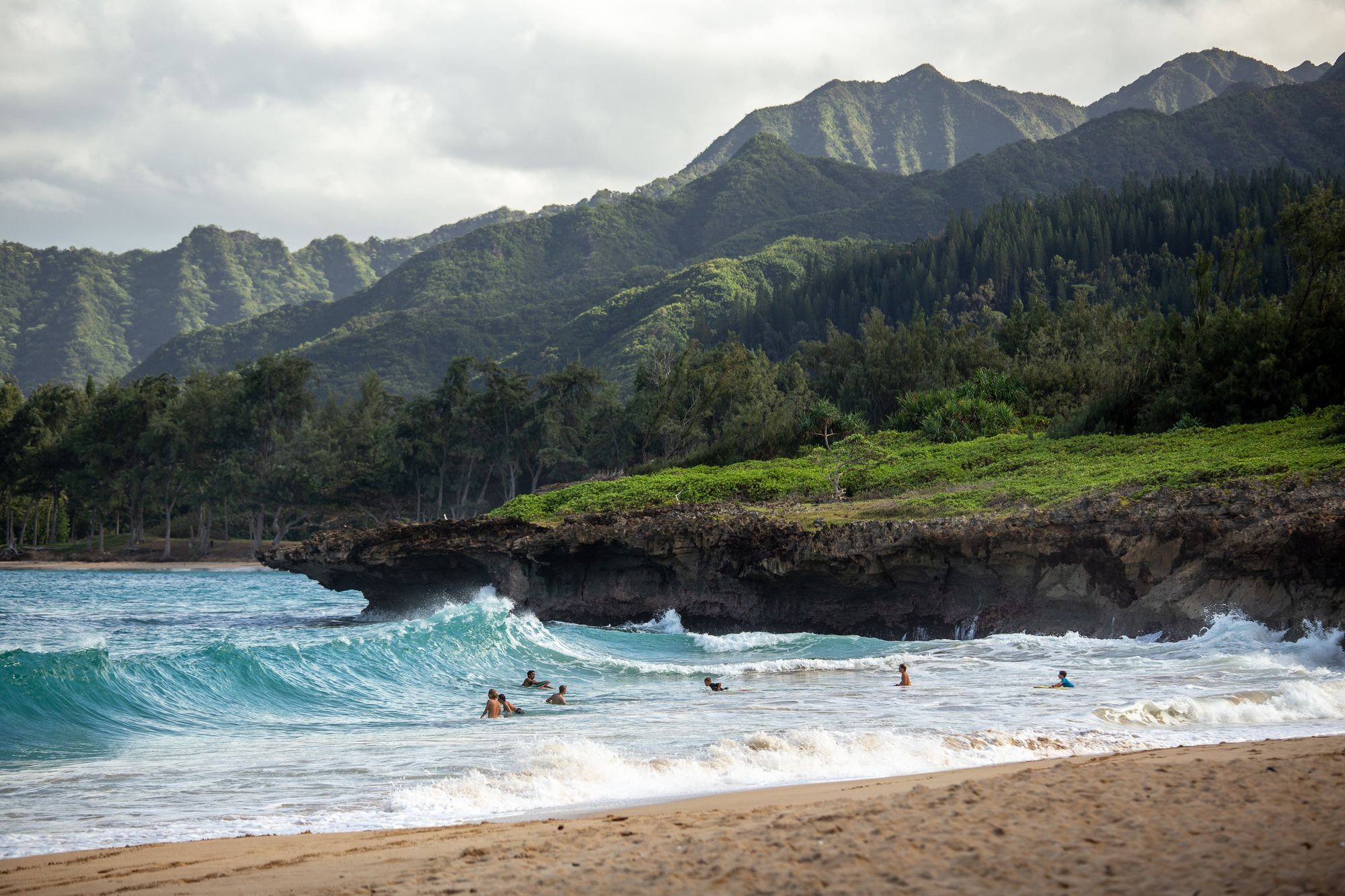
The opening of this book dragged a little, but served to establish Finnegan’s origin story:
My father liked to tell a story about a day when I got discouraged. From the warmth of the car, he had been watching me flounder—I imagine him smoking his pipe, wearing a big fluffy fisherman’s sweater. I came in, my feet and knees bleeding, stumbling across the rocks, dropping my board, humiliated and exhausted. He told me to go back out and catch three more waves. I refused. He insisted. I could ride them on my knees if necessary, he said. I was furious. But I went back out and caught the waves, and in his version of the story, that was when I became a surfer. If he hadn’t made me go back out that day, I would have quit. He was sure of that.
From a young age, Finnegan is independent and stubborn. As he becomes a teenager, he also becomes more withdrawn. He regards himself as somewhat of a reclusive romantic, using surfing as a vehicle to reach a higher spiritual plane.
What could rightly have worried my dad about me and surfing was the special brand of monomania, antisocial and ill-balanced, that a serious commitment to surfing nearly always brought with it. Surfing was still something that one did—that I did—with friends, but the club thing, the organized-sports part, was fading fast. I no longer dreamed about winning contests, as I had dreamed about pitching for the Dodgers. The newly emerging ideal was solitude, purity, perfect waves far from civilization. Robinson Crusoe, Endless Summer. This was a track that led away from citizenship, in the ancient sense of the word, toward a scratched-out frontier where we would live as latter-day barbarians. This was not the daydream of the happy idler. It went deeper than that. Chasing waves in a dedicated way was both profoundly egocentric and selfless, dynamic and ascetic, radical in its rejection of the values of duty and conventional achievement.
In his late teens, Finnegan takes a break from surfing to become a bit of a hippie. Channeling his inner Kerouac, he embarks on a cross-country road trip with his friend Domenic. They have teenage adventures – drinking in bars, dropping acid in New York City, ironically choosing not to make the trip to Woodstock:
It was 1969, the summer of Woodstock, but the flyers for the festival plastered around Greenwich Village mentioned an admission charge. That sounded lame to us—some kind of artsy-craftsy weekend for old people—so we skipped it. (My newsman’s intuition, never great, was then unborn.)
He also backpacked around Europe with his first serious girlfriend, Caryn, who is portrayed as his “true love” throughout the book. In his travels and relationship with Caryn, Finnegan’s restlessness and selfishness is apparent.
We had started to quarrel, Caryn and I, and we didn’t fight well. On the road, moreover, I turned into a tyrant, setting a merciless pace as we bummed around Western Europe, living on crackers and fresh air, sleeping under the stars. There was always someplace new, someplace better, we had to be. I dragged her on grueling pilgrimages to rock festivals (Bath) and surf towns (Biarritz) and the old haunts (and graves) of my favorite writers. Caryn, less callow, did not see the reason for all the hurry. She pressed dried flowers in her journal, went to museums, and, already fluent in French and German, undertook to learn each language we encountered. She finally dug in her heels on the western Greek island of Corfu after I announced that I had a burning desire to see more “Turkish influence.” I could go hunt for Ottoman minarets on my own, she said. And so I up and left her on the remote, mountain-backed beach where we were camping au naturel. Neither of us, I suppose, believed I would really do it, but I had become adept at, if nothing else, moving quickly through strange territory at low cost, and within a week I was in Turkey itself, newly intent on traveling overland to India. Motion, new companions, new lands were my drugs in those days—I found they did wonders for the adolescent nerves. Turkish influence fascinated me for about half an hour. Then only Tamil influence would do.
Holy shit. Finnegan abandons his 17-year-old girlfriend on a Greek island because he wants to see Turkey. Eventually, a few weeks later, he goes back for Caryn and finds her in a campground south of Munich. When he reunites with Caryn, he writes only, “She seemed fine”, and the two resume their travels.
Later, as a college dropout, he convinces Caryn to move with him to Hawaii so that he can chase waves. Here, Bill’s manipulative charm is in full force:
Caryn did have one motive that was her own for agreeing to come to Maui. Her father was reportedly there. Sam had been an aerospace engineer before LSD came into his life. He had left his job and family and, with no explanation beyond his own spiritual search, stopped calling or writing. But the word on the coconut wireless was that he was dividing his time between a Zen Buddhist monastery on the north coast of Maui and a state mental hospital nearby. I was not above mentioning the possibility that Caryn might find him if we moved to the island.
Eventually, Caryn puts her food down and they break up. Good for her.
The Search
By the age of 25, Finnegan has lived many lives. After his travels and his time living in Hawaii, he returns to California and graduates from college. He then gets a job as a brakeman on the railroad. This part of his life he glosses over in his memoir – I would have loved to see a lot more written about this.
The story picks up with him and his friend Bryan embarking on a round-the-world trip in pursuit of waves.
I had five thousand dollars in the bank, by far the most I had ever saved. I was twenty-five, and I had never been to the South Seas. It was time for a serious surf trip, an open-ended wave chase. Such a trip felt strangely mandatory. I would go west forever, like Magellan or Francis Drake—that was how I thought of it. In truth, difficult as it was, pulling up stakes was in many ways easier than staying. It gave me an excellent excuse to postpone mundane but frightening decisions about where and how to live. I would disappear from the overdetermined, underwhelming world of disco-dulled, energy-crisis America. I might even become another person—someone more to my liking—in the Antipodes.
A good memoir makes you reflect not only on the life of the person who wrote the book, but on your own life. I saw a lot of myself in this section of the book. A scary amount. Or at least, the part of me from my early 20s that thought traveling the world would provide a sense of meaning in my life.
Like Finnegan, I spent half a decade flying around the world in search of novelty, looking in hostels in South America or Southeast Asia for the answer to a question that I had never defined.
What was different for Bill, however, was the surf-centricity of his trip. As a surfer, he has a higher calling (cue eye roll from the rest of us) than the other backpackers he encounters.
Surfing, under the circumstances, was a godsend. It was our project, why we got up in the morning. After we ran across a group of Western backpackers in Apia, I grumbled, according to Bryan, that they “were nothing but goddam sightseers.” I didn’t remember saying that, but it was in fact how I felt. We did plenty of palagi looking-looking-looking ourselves, and there was something obscene about that, but at least we had a purpose, an objective, however fleeting, pointless, idle, and silly it might seem to anyone else.
Throughout this time, he and Bryan are reading and writing, which becomes apparent in reading the multi-page descriptions of a wave that Finnegan surfed 40 years ago. He captivates you with the romantic natures of becoming one with the ocean: the moment of encountering the divine in the barrel of the wave. He talks about finding the perfect wave on a desolate island – Tavarua, Fiji. He and Bryan camp there for a week, avoiding the snakes that blanket the island, surfing the perfect wave day after day. At the time, perhaps 10 people in the world knew about that wave.
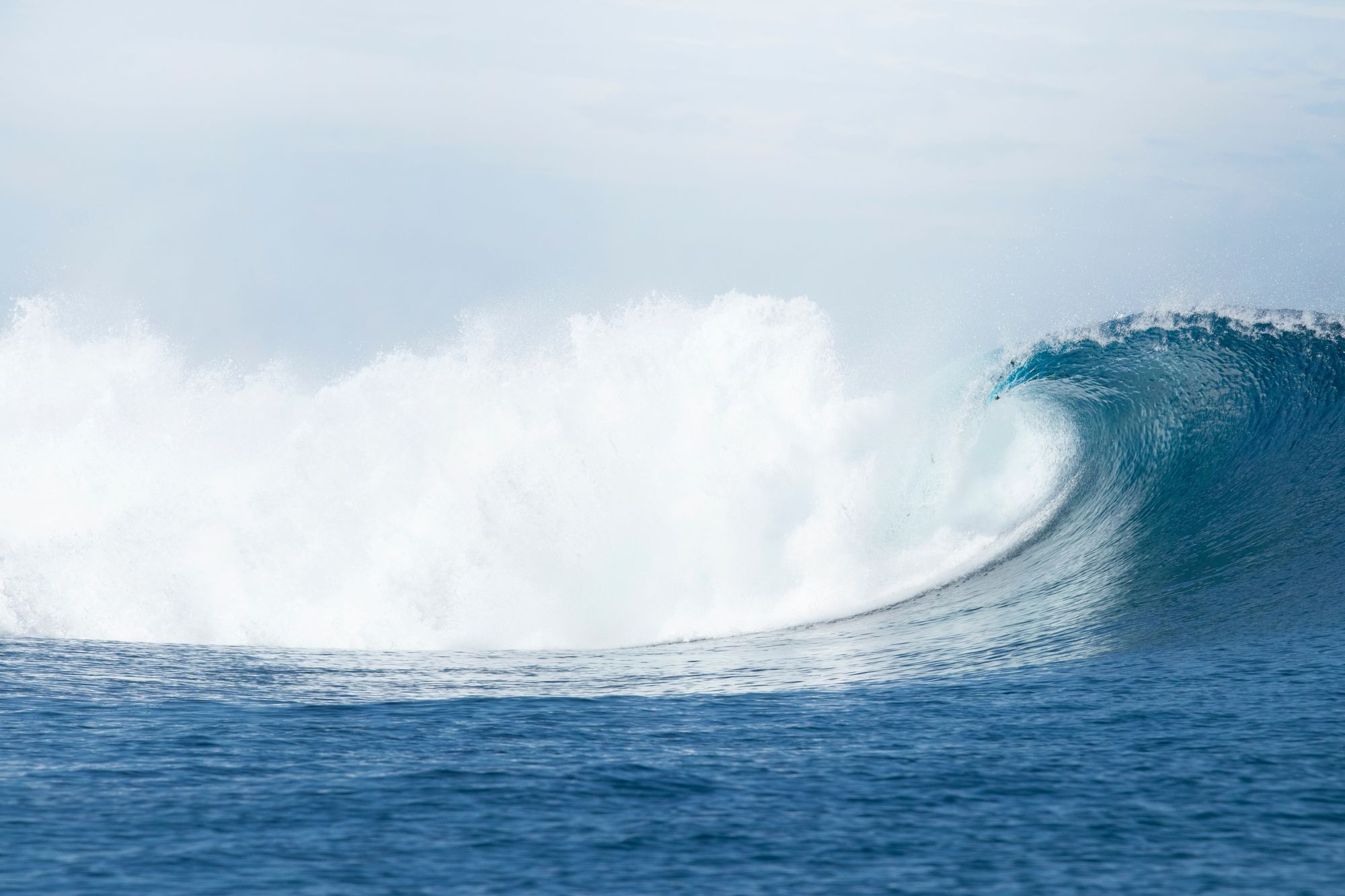
I first read this book having never surfed, yet I was spellbound. It is clear how much Finnegan is devoted to the pursuit.
Finnegan prioritizes surfing and his own ego above all else. He shows flashes of self-awareness, but throughout the book his narcissism is unparalleled. He leaves behind a string of girlfriends that he either abandons to travel – or worse, takes with him to live in squalor on remote, inhospitable islands, all in the pursuit of waves.
Was “surfing” even what I was doing? I chased waves instinctively, got appropriately stoked when it was good, got thoroughly immersed in working out the puzzle of a new spot. Still, peak moments were, by definition, few and far between. Most sessions were unremarkable. What was consistent was a certain serenity that followed a rigorous session. It was physical, this postsurf mood, but it had a distinct emotionality too. Sometimes it was mild elation. Often it was a pleasant melancholy. After particularly intense tubes or wipeouts, I felt a charged and wild inclination to weep, which could last for hours. It was like the gamut of powerful feelings that can follow heartfelt sex.
Later in the book, when he and Bryan recollect their travels, Bryan seems bothered by how they, as two relatively rich Westerners, took advantage of their hosts in the South Pacific. Bill isn’t nearly as troubled:
He [Bryan] once wrote that he had just realized that the hospitality we received back in 1978 from Sina Savaiinaea and her family in Samoa had cost them a lot of money, relative to their wealth, and that we had repaid them with trinkets rather than the cash that they desperately needed and were expecting but were too polite to mention. He was so horrified he couldn’t sleep. And I wasn’t at all sure he was wrong.
Many of us have a small voice inside calling to us to abandon any pretense of a normal life and live like a drifter. And isn’t life fleeting? Why not choose to live as a latter-day barbarian, surfing in tropical locales?
So this section of the book was alluringly romantic. It calls to us, reminiscent of the Choose Life monologue from Trainspotting, which argues there is no real difference between the hedonistic pursuit of pleasure through drugs and the rat race of chasing job promotions and the materialistic trappings of everyday life.
I get it! Bill isn’t hurting anyone. But don’t we have a greater responsibility to the world than this? Even Bill was full of self-doubt:
But I did wonder what I was doing with my life. We had been gone so long now that I felt unmoored from all possible explanations for this trip. It was certainly no longer a vacation. What was I vacationing from? I had wangled a one-year leave of absence from the railroad, which had run out while we were in Kirra. Officially resigning my job as a trainman, and my precious seniority date—June 8, 1974—had been unexpectedly difficult emotionally. I still believed I would never find another job so satisfying and well paid. But it was done. I panicked sometimes, convinced I was wasting my youth, aimlessly wandering on the dark side of the moon while old friends, classmates, my peers, were building lives, careers, becoming adults back in America. I had wanted to be useful, somehow, to work, to write, to teach, to accomplish great things—what had happened to that? Yes, I had felt compelled, almost required, to take a big surf trip. But did it really need to last this long?
As my partner put it: “This book was about his relationship with surfing. His wife, his daughter, friendships – they were only mentioned in relation to the ways that they interfered with his surfing. He’s obviously a smart guy – if he had spent half of his effort on something worthwhile rather than surfing, he could have cured cancer.”
After several years of travel, Finnegan eventually settles in apartheid South Africa and becomes a schoolteacher. Here, I think he first grows a conscience and realizes that the world is bigger than himself.
I had no right to judge how South Africans, black or white, dealt individually with their extraordinary situation, but working on the Cape Flats, seeing the workings of institutionalized injustice and state terror up relatively close, was deeply affecting me—was making me impatient with, among other things, myself. There was simply no escaping politics, and I found no common political ground with any of the surfers I met. So I chased waves alone.
Finnegan, ever the rebel, ignores orders to teach a curriculum that complies with the government regime. He does what he can to help his black students. While his efforts come from the right place, as an outsider they are noticeably ham-handed. One example: he begins a career-counseling project for his students, trying to get them permits to attend formerly all-white colleges. In doing so, he wades into a morass of politics, not knowing that applying for a permit was extremely controversial as it served to perpetuate the system of inequality.
In the end, I came to see my careers program as an enormous American folly, even in some cases quite destructive, where it encouraged false hopes or encouraged kids to defy boycotts that I knew nothing about.
Yet at least Finnegan is thinking of people other than himself. He beings to take his career as a writer much more seriously:
At the end of the school year, I found myself vowing to take no more day jobs. I would write for a living, period. I started writing essays, short features, for American magazines. I wrote nothing about South Africa—though I had a pile of overflowing notebooks. I yearned to go home—wherever exactly that might be. I clung to a line in one of Bryan’s letters. He had moved back to Missoula. There was a spot on the softball team for me, he wrote. A spot on the softball team.
Big Waves, Big Egos
From South Africa, Finnegan moves to San Francisco to pursue a career in journalism in earnest.
San Francisco is not particularly known for its surfing. In fact, most people don’t realize that people surf in the city. Most can’t. But if you’re willing to brave 40 degree water and 20 foot waves, you can shred some serious gnar in the shadow of the Golden Gate Bridge.
I once read an interview of a war reporter who said that the military is one of the only places where men can express love [1] for one another. That society has so stunted men emotionally that they need the trials of war to tell their friends that they care about them.
I think that you can extend this – at least for those of us who have not been on the battlefield – to sports. For what are sports if not men playacting war? In the case of surfing, you risk death by drowning every time you're out there. In this chapter of the book, surfing is the vehicle in which male friendships and emotions are explored.
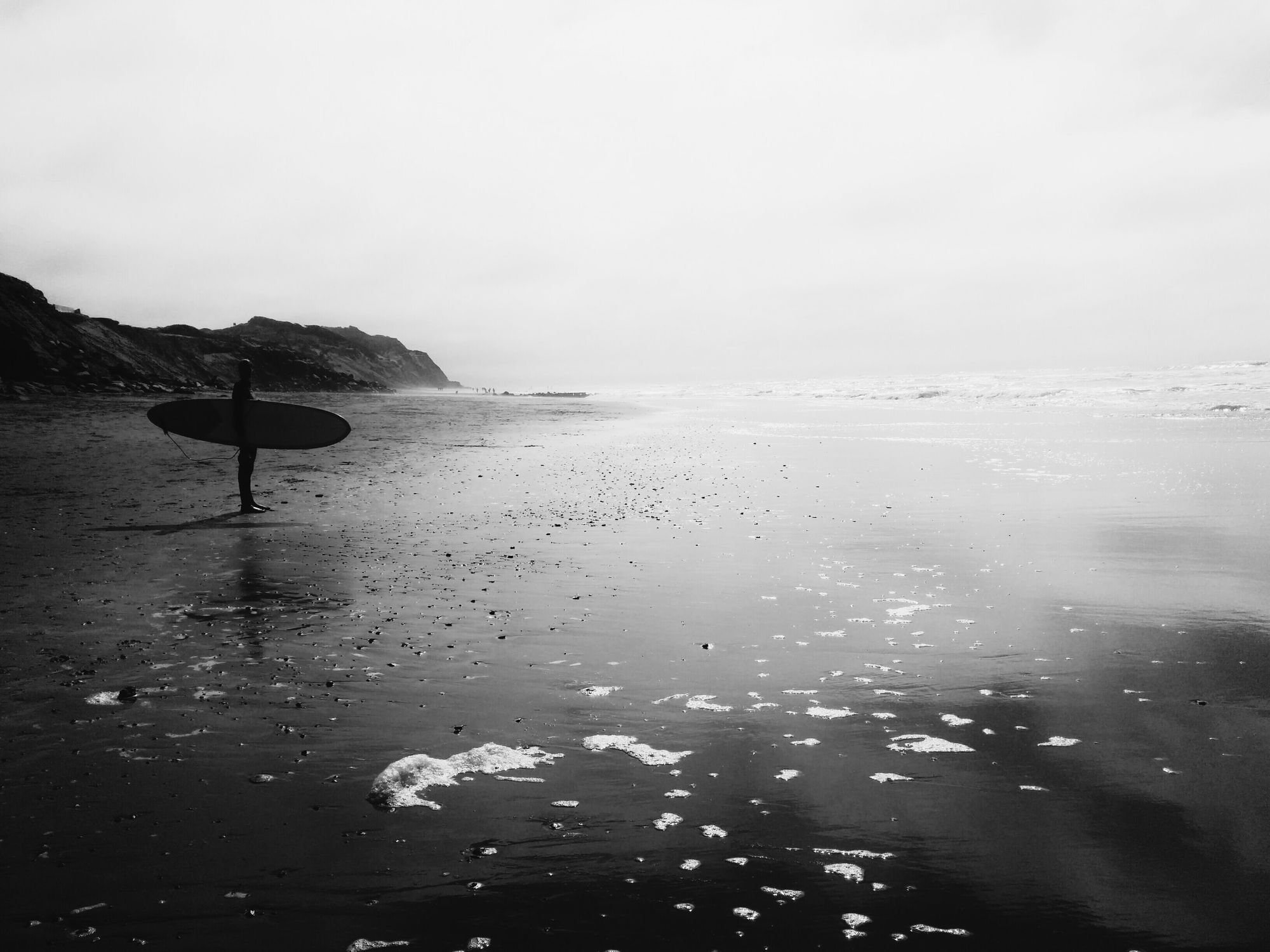
In the big waves of San Francisco, big personalities come out. In particular this chapter highlighted two larger-than-life characters.
- Doc (Mark Renneker), a brash doctor who broke every rule of surfing etiquette and was the most polarizing surfer in San Francisco, either loved or reviled by every other surfer in the city.
- Peewee (Bill Bergerson), a local carpenter who was extraordinarily reserved, down-to-earth, and best introduced by the following story:
Once, on a crowded day at VFW’s during my first winter in San Francisco, a local surfer was behaving badly—stealing waves, jumping the queue, and threatening anyone who objected. Peewee warned him once, quietly. When the guy kept it up, then nearly decapitated another surfer with a clumsy pullout, Peewee invited him to leave the water. The miscreant snarled. Peewee knocked him off his board, turned his board over, and, with small, sharp blows with the heel of his hand, broke off each of his three fins. The guy paddled in. Years later, Ocean Beach regulars who hadn’t seen this incident were still asking those who had to tell it again.
Doc was famously committed to surfing big waves. While he lived with his long-term girlfriend, he refused to get married, because once you get married (and especially after you have kids), you become too risk-intolerant for massive swells.
“The rule about guys getting married: their readiness to ride big waves goes down one notch immediately,” he liked to say. “And it goes down another big notch with each kid. Most guys with three kids won’t go out in waves over four feet!”
Mark had a commitment to surfing that makes Finnegan look positively listless.
Recalling his L.A. youth, he told me, “Among my friends, there was a strong belief in the surfer’s path. Most people swerved from it sooner or later.” For his models for aging well, he looked to older surfers—he called them “elders.” Doc Ball, a lifelong surfer and retired dentist in Northern California, then in his eighties, was a favorite. “He’s still stoked,” Mark said. “He still skateboards!”
Peewee, on the other hand, struck me as preternaturally wise, at least if I were grading on curve for surfers.
“It’s such a great sport it corrupts people,” he said. “It’s like drug addiction. You just don’t want to do anything else. You don’t want to go to work. If you do, it’s always ‘You really missed it’ when you get off.” As a carpenter, Peewee said, he had some job flexibility, and he tried to take a month off each year to go surfing someplace else, like Hawaii or Indonesia. But there was no way that he could surf as avidly as he had surfed while growing up—not without risking dereliction…
He was equally closemouthed on the subject of big waves. He preferred them to small waves, he said, because they were uncrowded. “Crowds can get tense,” he said. “In big waves, it’s just you and the ocean.” Peewee was known around Ocean Beach for his iron nerves in big surf, but it took him a number of years, he said, to build up to facing very big waves. “Each new wipeout makes you realize, though, that you’re actually safer than you thought. It’s just water. It’s just holding your breath. The wave will pass.” Did he never panic? “Sure. But all you have to do, really, is relax. You’ll always come up.” In retrospect, he said, the times when he had thought he was drowning were not in fact such close calls.
How the World Goes On
After San Francisco, Bill moves to New York where he becomes a staff writer for The New Yorker. Still, he manages to surf nonstop. He makes annual pilgrimages to Madeira, in Portugal, where he encounters harrowing waves.
There was another one [wave]. It was bigger than the others. But the important thing about it was that it sucked all the water off the shelf. Boulders started surfacing in front of me, and then I was standing in a field of rocks in rushing, waist-deep water. I did not understand where I was—a field of rocks had risen out of the ocean, quite far from shore, at a break I thought I knew. In a lifetime of surfing, I had never seen anything like this. The wave mutated into a hideous, boiling, two-story wall of whitewater almost without breaking—it had run out of water to draw from. I had a moment in which to decide what to do before it hit me. I picked a fissure in the wall and threw myself up and into it. The vague hope was that if I wriggled in deep enough, the whitewater might swallow me rather than simply smash me to pieces on the rocks. Something like that occurred, apparently. My feet were sliced up from the leap, but I did not hit the bottom as I rag-dolled shoreward in the bowels of the wave. And when I next surfaced I was in deep water, in the channel east of Pequena, safe…
That night, back in Jardim, I lay in the dark on a lumpy cot thinking about quitting surfing. The southeast wind groaned in the eaves of the old house where I was staying. Various parts of me hurt. My left eye was weeping from too much sun and saltwater. One hand throbbed from a gash received trying to get ashore at Madonna. The other hand throbbed with urchin spines picked up in a collision with the reef at Shadowlands the week before. Both feet ached with infected cuts. My lower back felt like I had spent the month digging a ditch. I truly was too old for this. I was losing my quickness, my strength, my nerve. Why didn’t I just leave it to guys in their physical prime, like André? Even the guys my age who still tried to ride serious waves—guys in their forties, even fifties—managed to get in the water two hundred, three hundred days a year. Who was I kidding, trying to skate by on a small fraction of that? Why not walk away while I could? Would quitting really leave such a big psychic hole?
For the rest of the book, Finnegan makes the excuses of an addict. Well into middle age, he constantly takes the risks you’d expect from an 18-year-old. He has a wife and child, yet goes out in waves alone that all other surfers are content to watch from shore.
I found myself getting more reckless, even before my parents died. In Dubai, chasing a story about human trafficking, I stepped on the toes of Uzbek slavers and their local protectors and had to leave the emirate in a hurry. Reporting on organized crime in Mexico, I edged further into the lion’s den than I should have. This was the sort of work I had sworn off when Mollie was born. The same impulses were showing up in my surfing. I went to Oaxaca to ride Puerto Escondido, which is generally considered the heaviest beachbreak in the world. I snapped two boards and came home with a perforated eardrum. I wasn’t turning into a big-wave surfer—I would never have the nerves for that—but I was pushing into places where I did not belong. On the bigger days at Puerto, I was the oldest guy in the water by decades. What did I think I was doing? I liked the idea of growing old gracefully. The alternative was, after all, mortifying. But I rarely gave my age a conscious thought. I just couldn’t seem to pass up even a slim chance of getting a great wave. Was this some backward, death-scorning way to grieve? I didn’t think so. A few weeks after my sixtieth birthday, I pulled into two barrels, back-to-back, at Pua‘ena Point, on the North Shore of Oahu. They were as deep and long as any tube I had ridden since Kirra, more than thirty years before. Both waves let me out untouched. Being adjacent to that much beauty—more than adjacent; immersed in, pierced by it—was the point. The physical risks were footnotes.
He’s condemned by self-love. He’s entirely full of himself. But at least he is self-aware enough to recognize all of this.
Despite how hard I’ve been on Bill throughout this review, I absolutely loved this book. I read it for the first time in the summer of 2019, in a surf-themed bar on the Lower East Side. I re-read it in San Diego, where quotes from the book bounced around my head while I paddled out into waves. The writing in this book is beautiful – I hope that my liberal sampling of quotes does it justice.
While William Finnegan is not exactly a sympathetic character, that is in part because he has lived a life that induces envy, one that most of us could only dream of. He ends his memoir recounting a surf session in Tavarua, which has been turned into a luxury surf resort:
The waves kept pouring through, shining and mysterious, filling the air with an austere exaltation. Inia was on fire, as a surfer, as a preacher. Did I still doubt? “We will not fear, though the earth give way and the mountains fall into the heart of the sea, though its waters roar and foam.” I continued to doubt. But I was not afraid. I just didn’t want this to end.
That’s exactly how I felt reading this book.
If you read books, read William Finnegan's Barbarian Days. It's one of those rare books that divide your life into two parts: before you read it, and after. https://t.co/BTODaei5hr
— Paul Graham (@paulg) August 28, 2019
